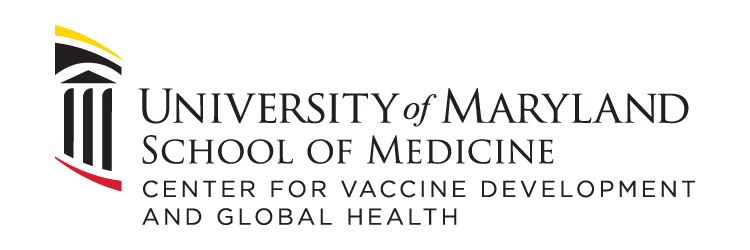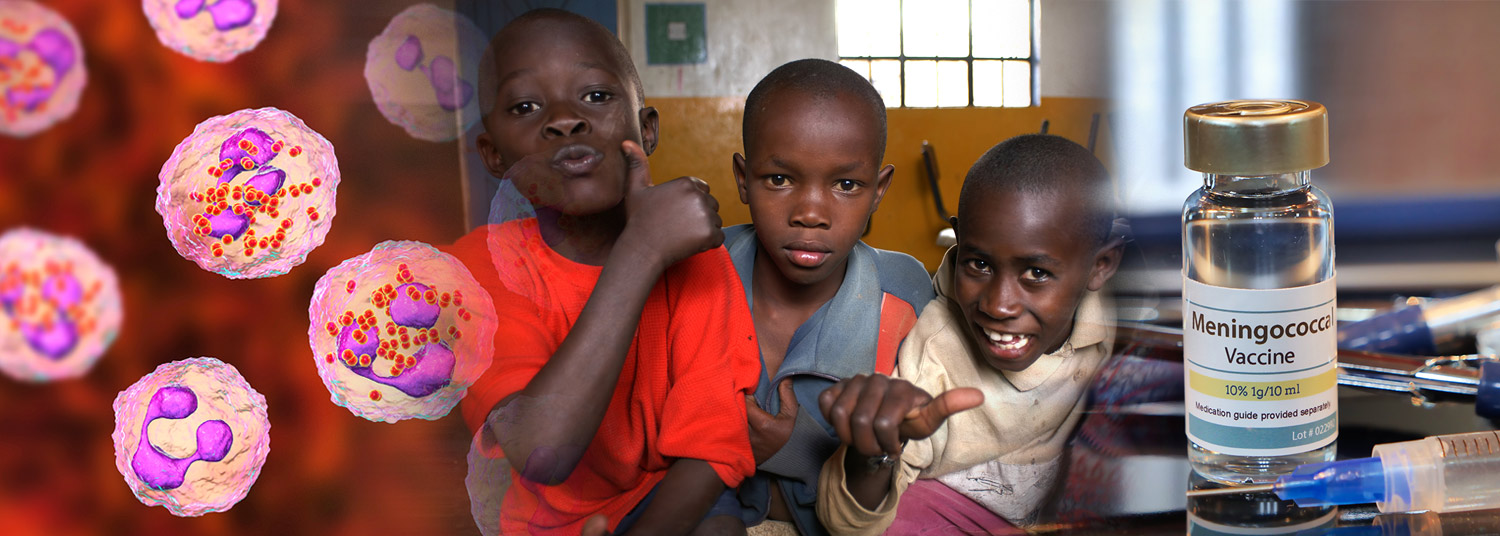March 24, 2022 | January Payne
If successful, this study could lead to World Health Organization approval
Researchers at the University of Maryland School of Medicine (UMSOM)’s Center for Vaccine Development & Global Health (CVD) are leading a study to evaluate the use of a pentavalent – or five in one – meningococcal conjugate vaccine (NmCV-5) among infants and young children in the meningitis belt of sub-Saharan Africa. This is the final and pivotal study for World Health Organization (WHO) prequalification of this vaccine, which is the last stage to make the vaccine available for low- and middle-income countries.
The study is part of the Infectious Diseases Clinical Research Consortium (IDCRC), a clinical trials network established by the National Institute of Allergy and Infectious Diseases in 2019. UMSOM’s Vaccine Treatment and Evaluation Unit (VTEU) is performing the study in partnership with the Center for Vaccine Development-Mali (CVD-Mali). The international global health organization PATH is providing support for study design, and it is managing and funding the serology testing. Serum Institute of India is providing study vaccines and technical support for study design.
Meningococcal meningitis, caused by invasive strains of Neisseria meningitidis, is a major public health concern because of its considerable morbidity and mortality, including high rates of death and permanent disability, in sub-Saharan Africa. Case fatality during meningococcal meningitis epidemics can surpass 15 percent, and rates of long-term complications among meningitis survivors in Africa are twice as high as in high-income countries. Because of the rapid onset of invasive bacterial meningitis and difficulties in access to care in the African meningitis belt, prevention by vaccination is the optimal way to reduce meningitis cases.

Study participants will include infants randomized to receive a meningococcal vaccine at 9 months or 15 months. Infants randomized to the 9-month age group will be further randomized in a 2:1 ratio to receive a single dose of the experimental meningococcal vaccine (NmCV-5) or a single dose of the comparator meningococcal vaccine (MenACWY-TT, Nimenrix). Infants randomized to the 15-month age group will be randomized in a 2:1 ratio to receive a single dose of NmCV-5 or a single dose of MenACWY-TT.
If results from the study are encouraging and the vaccine subsequently gets WHO approval, it could lead to a monumental shift in the burden of meningitis felt acutely in susceptible parts of Africa.

NmCV–5 is designed to protect against the following meningitis types – A, C, W, X, and Y – all epidemic-causing strains currently circulating in the African meningitis belt. The vaccine is heat stable at 40 degrees (Celsius), and it will be affordable for African countries. It will be the only vaccine offering protection against the X meningitis strain. It already has been found safe and immunogenic for people ages 1 to 29 in Africa. The vaccine is developed by the Serum Institute of India Pvt. Ltd. in partnership with PATH.
“NmCV-5 is a groundbreaking vaccine that has the potential to end meningococcal disease epidemics in the African meningitis belt for good. To fully realize that potential, we must ensure it is available for routine use in young children and infants. This study will help expand the evidence base for NmCV-5 and advance access to a vaccine that could prevent tens of thousands of cases of meningitis and save thousands of lives every year,” said Mark Alderson, PhD, bacterial vaccines initiative leader at PATH.
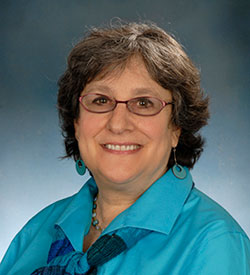
Rajeev Dhere, PhD, Executive Director at the Serum Institute of India Pvt Ltd., added that the vaccine is the “world’s first pentavalent meningococcal conjugate vaccine containing serogroup X.” He said that after “widespread use of MenAfrivac, meningococcal A disease has been virtually eliminated from the African meningitis belt.” Similarly, NmCV-5 has the “potential to end meningococcal disease epidemics caused by other predominant serogroups,” Dhere said.

Visit ClinicalTrials.gov for additional details. The IDCRC, in collaboration with the National Institute of Allergy and Infectious Diseases (NIAID) at the National Institutes of Health, is conducting this study. The research is supported by NIAID cooperative agreement UM1AI148689.
About the University of Maryland School of Medicine
Now in its third century, the University of Maryland School of Medicine was chartered in 1807 as the first public medical school in the United States. It continues today as one of the fastest growing, top-tier biomedical research enterprises in the world -- with 46 academic departments, centers, institutes, and programs, and a faculty of more than 3,000 physicians, scientists, and allied health professionals, including members of the National Academy of Medicine and the National Academy of Sciences, and a distinguished two-time winner of the Albert E. Lasker Award in Medical Research. With an operating budget of more than $1.3 billion, the School of Medicine works closely in partnership with the University of Maryland Medical Center and Medical System to provide research-intensive, academic and clinically based care for nearly 2 million patients each year. The School of Medicine has nearly $600 million in extramural funding, with most of its academic departments highly ranked among all medical schools in the nation in research funding. As one of the seven professional schools that make up the University of Maryland, Baltimore campus, the School of Medicine has a total population of nearly 9,000 faculty and staff, including 2,500 students, trainees, residents, and fellows. The combined School of Medicine and Medical System (“University of Maryland Medicine”) has an annual budget of over $6 billion and an economic impact of nearly $20 billion on the state and local community. The School of Medicine, which ranks as the 8th highest among public medical schools in research productivity (according to the Association of American Medical Colleges profile) is an innovator in translational medicine, with 606 active patents and 52 start-up companies. In the latest U.S. News & World Report ranking of the Best Medical Schools, published in 2021, the UM School of Medicine is ranked #9 among the 92 public medical schools in the U.S., and in the top 15 percent (#27) of all 192 public and private U.S. medical schools. The School of Medicine works locally, nationally, and globally, with research and treatment facilities in 36 countries around the world. Visit medschool.umaryland.edu
About Infectious Disease Clinical Research Consortium (IDCRC)
This activity is supported by the Infectious Diseases Clinical Research Consortium (IDCRC) through the National Institute of Allergy and Infectious Diseases (NIAID) (UM1AI148684). The IDCRC, consisting of the Vaccine Treatment and Evaluation Units (VTEUs) and the IDCRC Leadership Group, was formed in 2019 to support the planning and implementation of infectious diseases clinical research that efficiently addresses the scientific priorities of NIAID. The consortium includes infectious diseases leaders and clinical researchers from Emory University, University of Maryland School of Medicine, Baylor College of Medicine, Cincinnati Children’s Medical Center and University of Cincinnati, FHI360, Fred Hutchinson Cancer Research Center, Johns Hopkins University, Kaiser Permanente Washington Health Research Institute, New York University, Saint Louis University, Vanderbilt University Medical Center, University of Alabama at Birmingham, University of Rochester, University of Washington, and NIAID. For more information about the IDCRC, please visit www.IDCRC.org.
About the University of Maryland School of Medicine Vaccine Treatment and Evaluation Unit (VTEU)
NIAID established the Vaccine and Treatment Evaluation Units (VTEUs) in 1962 as a consortium comprising centers of excellence for conducting clinical trials to develop new and improved vaccines and therapies against infectious diseases. University of Maryland School of Medicine (UMSOM) investigators have been the recipients of this award for over four decades (current award number 5UM1AI148689) and have conducted hundreds of clinical trials to develop products that can be used to reduce disease burden and to counteract existing and emerging public health threats. In keeping with our focus on bringing vaccines to underserved populations globally, we perform international studies of vaccines to prevent the major killers of children in the world, including malaria, meningitis, diarrheal disease, and pneumonia. With its rapid response capability, the VTEU at UMSOM plays leadership roles in pivotal trials that support approval and licensure of vaccines and therapeutics to control pandemics including the 2009 swine flu and COVID-19. Other trials have strengthened the national stockpile of vaccines to prevent infections that could be used as a bioterrorist weapon against the U.S., such as smallpox and anthrax. Innovative strategies are used to expand the array of pathogens that can be prevented with vaccines, and to improve delivery, strengthen effectiveness, and expand supply and access to these life-saving measures. The VTEU at UMSOM conducted the first clinical study of an edible vaccine that that might protect against travelers’ diarrhea, evaluated numerous needle-free vaccine administration strategies, developed combination vaccines so fewer inoculations could prevent more infections, and tested a topical antibiotic to prevent serious infections among critically ill infants. The broad opportunities provided by the VTEU has contributed to the training of generations of vaccinologists.
Contact
January Payne
Director of Public Relations
(443) 203-8183
january.payne@som.umaryland.edu
Related stories

Tuesday, April 30, 2024
A Critical Insight: Dengue Human Challenge Model Prevents Potential Vaccine Missteps
The University of Maryland School of Medicine (UMSOM) Dean, Mark T. Gladwin, MD, announced that Miriam K. Laufer, MD, Professor of Pediatrics, Medicine, and Epidemiology & Public Health, has been appointed as the Interim Head of UMSOM's Center for Vaccine Development and Global Health (CVD).

Tuesday, April 30, 2024
Miriam K. Laufer Appointed Interim Director of the Center for Vaccine Development and Global Health
The University of Maryland School of Medicine (UMSOM) Dean, Mark T. Gladwin, MD, announced that Miriam K. Laufer, MD, Professor of Pediatrics, Medicine, and Epidemiology & Public Health, has been appointed as the Interim Head of UMSOM's Center for Vaccine Development and Global Health (CVD).

Thursday, March 28, 2024
NIH selects Dr. Kathleen Neuzil as Director of The Fogarty International Center
Kathleen M. Neuzil, MD, MPH, Director of the University of Maryland School of Medicine’s (UMSOM) Center for Vaccine Development and Global Health, has been named the 13th director of the Fogarty International Center (FIC), which is part of the National Institutes of Health (NIH). Dr. Neuzil will be the first woman to hold the permanent directorship since the center’s founding in 1968 and will also hold the position of Associate Director for International Research at NIH.

Thursday, October 12, 2023
UM School of Medicine's Kirsten Lyke Elected as Member of Prestigious National Academy of Medicine
Kirsten E. Lyke, MD, Professor of Medicine and Physician-Scientist at the Center for Vaccine Development and Global Health (CVD) at the University of Maryland School of Medicine (UMSOM), was elected this week as a new member of the National Academy of Medicine (NAM). She was recognized for her pivotal research in emerging infections and human challenge models that have informed and shaped global vaccine and public health policy.

Monday, October 02, 2023
UM School of Medicine Researchers Present Interim Results on Meningococcal Vaccine for Infants and Young Children in Africa
University of Maryland School of Medicine (UMSOM) researchers, as part of the Infectious Diseases Clinical Research Consortium (IDCRC), provided an interim analysis showing that the pentavalent (NmCV-5) meningitis vaccine is safe for use in 9-month-old infants in the meningitis belt of sub-Saharan Africa. They presented their results to the World Health Organization’s (WHO) Strategic Advisory Group of Experts (SAGE) on Immunization on September 26.

Thursday, January 26, 2023
Small Study Shows Promise for Antimalarial Monoclonal Antibody to Prevent Malaria
A monoclonal antibody treatment was found to be safe, well tolerated, and effective in protecting against malaria in a small group of healthy volunteers who were exposed to malaria in a challenge study, according to new research published in by researchers at the University of Maryland School of Medicine (UMSOM).
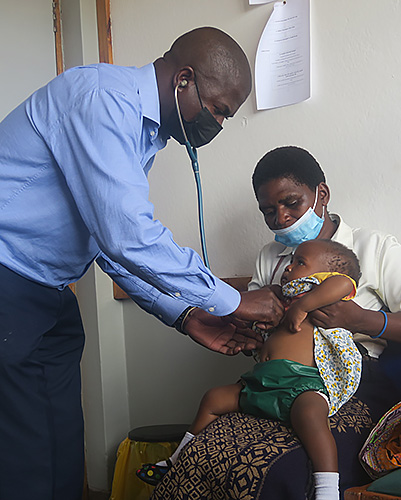
Tuesday, August 09, 2022
New Study Confirms Typhoid Vaccine Safety, Immune Response in Children
A new study, published in The Lancet Global Health, finds typhoid conjugate vaccine, Typbar TCV®, provides immunity for up to 3 years in children as young as 9 months old in Malawi. The research – conducted by the Blantyre Malaria Project, Malawi-Liverpool-Wellcome Trust, and researchers at the Center for Vaccine Development and Global Health (CVD) at the University of Maryland School of Medicine (UMSOM) – found that the TCV vaccine is safe and well tolerated. Importantly, the vaccine can be given to 9-month-old infants at the same time as routine measles-rubella vaccinations without reducing the immune response to either vaccine.

Monday, August 08, 2022
New Study Finds Rapid Decline in Vaccine-Boosted Neutralizing Antibodies Against Omicron Subvariant BA.5
A study led in part by investigators at the University of Maryland School of Medicine’s (UMSOM) Center for Vaccine Development and Global Health found that although COVID-19 booster vaccinations in adults elicit high levels of neutralizing antibodies against the Omicron variant of SARS-CoV-2, those antibody levels decrease substantially within three months. Kirsten E. Lyke, MD, Professor of Medicine at UMSOM and scientist at CVD, is Co-Chair and site Principal Investigator for the study, and Meagan Deming, MD, PhD, Assistant Professor of Medicine at the UMSOM, also a scientist at CVD, is Vice-Chair of the study, which is a collaboration between investigators at the UMSOM’s CVD and the Institute of Human Virology (IHV).

Wednesday, January 27, 2021
Dr. Wilbur Chen, Nationally-Recognized Vaccine Researcher, Selected for Federal Committee that Guides Immunization Policies
Wilbur H. Chen, MD, MS, FIDSA, FACP, Professor of Medicine at the University of Maryland School of Medicine (UMSOM), has been named a new voting member of the federal government’s Advisory Committee on Immunization Practices (ACIP), the prestigious board of experts that makes recommendations on the safe use of vaccines for Americans. The U.S. Department of Health and Human Services selected Dr. Chen for the 15-member advisory committee based on his expertise and national leadership in vaccinology, infectious diseases, public health, and preventive medicine. He will remain in his current role at UMSOM while he serves in his four-year term, which began last month.

Tuesday, December 10, 2019
UMSOM Researchers to Test Vaccine Designed to Protect Against Serious Illness from Contaminated Food and Water
Each year, millions of people contract serious diarrheal illnesses typically from contaminated food and water. Among the biggest causes of diarrheal diseases are the bacteria Shigella and enterotoxigenic Escherichia coli (ETEC), and researchers at the University of Maryland School of Medicine are testing a vaccine designed to offer protection against these serious pathogens.

Tuesday, March 20, 2018
UMSOM Vaccine Experts Lead Trial on Avian Flu Vaccine
Vaccine experts at the University of Maryland School of Medicine (UMSOM) have begun multiple clinical trials of vaccines designed to protect against H7N9, an avian influenza virus that was first reported in humans in 2013 in China.
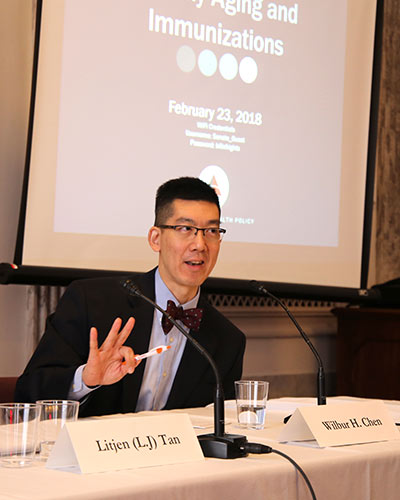
Friday, February 23, 2018
UMSOM Vaccine Expert Highlights Need for Vaccination Among Older Adults During Capitol Hill Briefing
Today at a briefing on Capitol Hill, Wilbur Chen, MD, MS, Associate Professor of Medicine at the University of Maryland School of Medicine, warned that the U.S. population of adults 65 and older is expected to rise significantly over the next few decades, making vaccinations against diseases like influenza, pneumonia and shingles for this population very critical.
